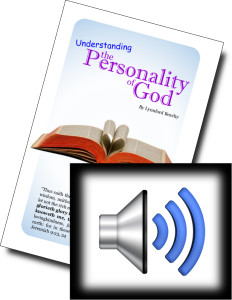Chapter 5
Are the Dead Really Dead?
This is an important question that must be answered before we can truly understand the sufferings of Christ. Are the dead really dead? Satan would have us believe that the dead are not really dead, but consciously living either in paradise or misery. Satan has said from the very beginning, “ye shall not surely die” (Genesis 3:4). Satan taught that man could disobey God and still live forever without dying. This statement directly contradicts God who said, “thou shalt surely die” (Genesis 2:17). Since that day Satan has continued to teach men that they will not surely die. According to Satan, all men who have ever died are not really dead. Sadly, many Christians believe Satan’s lie today. They think that death is not really death, but rather a continuation of life in another realm. This teaching in Christianity is a fruit of the unholy trinity doctrine. The Catholic Church admits that they formulated the trinity doctrine, and they claim, “The mystery of the Trinity is the central doctrine of the Catholic Faith. Upon it are based all the other teachings of the Church” (Handbook for Today’s Catholic, page 11). The idea that the dead are not really dead is based upon the false doctrine of the trinity. Notice what Augustine, one of the primary persons who formulated the trinity doctrine, had to say about the death of Christ:
“No dead man can raise himself. He [Christ] only was able to raise Himself, who though His Body was dead, was not dead. For He raised up that which was dead. He raised up Himself, who in Himself was alive, but in His Body that was to be raised was dead. For not the Father only, of whom it was said by the Apostle, ‘Wherefore God also hath exalted Him,’ raised the Son, but the Lord also raised Himself, that is, His Body” (Nicene & Post-Nicene Fathers, series 1, volume 6, page 656, St. Augustine, “Sermons on Selected Lessons of the New Testament”).
It is true that a dead man cannot raise himself from the dead, for he cannot even think. Thus saith the Lord, “The dead know not any thing” (Ecclesiastes 9:6). In Augustine’s words we see the very seeds of that unholy teaching about death which claims dead people are not dead. Notice in his statement Augustine rightly remarks that dead men cannot raise themselves, since they are not alive, but then he goes on to make the assumption that Jesus Christ was not dead. This idea could easily be modified to include every dead person. For if, in the Bible, Christ is said to have died, but the trinity doctrine claims He did not die, then it is only logical to believe that when the Bible speaks of others dying that they too must have remained alive. This is how most Christians today have been duped into believing dead people are really alive somewhere, even though the Bible is so plain on the subject. Let us notice a few verses on this point:
“Put not your trust in princes, nor in the son of man, in whom there is no help. His breath goeth forth, he returneth to his earth; in that very day his thoughts perish” (Psalm 146:3, 4). When a person dies his thoughts perish; he can no longer think. He remains asleep in the dust, unconscious of anything, until the Lord raises him from the dead.
Death is called sleep. “And many of them that sleep in the dust of the earth shall awake, some to everlasting life, and some to shame and everlasting contempt” (Daniel 12:2). Isaiah wrote, “Thy dead men shall live, together with my dead body shall they arise. Awake and sing, ye that dwell in dust: for thy dew is as the dew of herbs, and the earth shall cast out the dead” (Isaiah 26:19). The first thing we notice about this verse is that the dead men shall, at some time in the future, live again. These people are not living now, but they shall live at some time in the future. Right now they are those who dwell in the dust. When we die we return to dust, there to remain in unconscious sleep until the Lord raises us from the dead.
What About the Spirit of Man?
In the book of Job it says, “There is a spirit in man: and the inspiration of the Almighty giveth them understanding” (Job 32:8). Daniel explained, “I Daniel was grieved in my spirit in the midst of my body” (Daniel 7:15). A spirit is the part of a person that can be grieved. In Mark’s gospel we read, “And immediately when Jesus perceived in his spirit that they so reasoned within themselves, he said unto them, Why reason ye these things in your hearts?” (Mark 2:8). The king of Babylon had a dream, and he told his wise men, “I have dreamed a dream, and my spirit was troubled to know the dream” (Daniel 2:3). A spirit is the part of a person that can perceive or understand things, and can be grieved or troubled. These few Bible texts confirm the definition of “spirit” found in The American Heritage Dictionary, which says, “The part of a human being associated with the mind, will, and feelings.”
What happens to this spirit when a person dies? Solomon wrote, “Then shall the dust return to the earth as it was: and the spirit shall return unto God who gave it” (Ecclesiastes 12:7). Notice that this refers to all people who die, whether they are the most righteous saint, or the most wicked sinner. When any man dies, there will be a time when he lives again, whether he is raised in the resurrection of the just, or of the unjust (Acts 24:15). His mind, which contains his life history, will be given to him again at his resurrection. He will come forth from the grave with the same character and manner of thinking that he had before death. When the dead are raised, God will give them back their spirit (or mind), which was in them before. During their sleep in the grave they were not alive anywhere.
Every person will be raised, therefore, God has to retain a record of his life, so that same person can return at the resurrection; God retains their spirits in an unconscious condition. Solomon wrote, “Who knoweth the spirit of man that goeth upward, and the spirit of the beast that goeth downward to the earth?” (Ecclesiastes 3:21). At death, the spirit of an animal goes down to the earth because there is no need for God to retain it, for there is no resurrection for animals. But the spirit of man goes upward to God, there to remain in an unconscious condition until the resurrection.
“But,” some may say, “don’t the righteous go straight to heaven when they die, and the wicked go to a place of torment?” “Men and brethren, let me freely speak unto you of the patriarch David, that he is both dead and buried, and his sepulchre is with us unto this day.… For David is not ascended into the heavens: but he saith himself, The Lord said unto my Lord, Sit thou on my right hand” (Acts 2:29, 34). David will be in heaven, but he has not yet ascended to heaven. His spirit has gone back to God in an unconscious condition, waiting to be reunited with his body. The same is true of the wicked. “That the wicked is reserved to the day of destruction? they shall be brought forth to the day of wrath” (Job 21:30). The Lord is reserving the wicked for the day of destruction. They shall be brought forth, or raised from the dead, to the day of wrath. They are not suffering right now.
I would like to use a cassette tape to illustrate what the Bible is saying. Suppose I put a cassette tape in a cassette recorder and begin to record information on the tape. As long as the tape is in the tape player, it can function. I can record information onto it, and play back what is recorded. But as soon as I remove the cassette tape from the cassette recorder, it can no longer function. The tape without the recorder is useless, just as the tape recorder is useless without a tape. Neither can function by themselves. If I remove the tape and destroy the tape player, I can replace it, but if I destroy the tape, then I have lost the information, it is not replaceable. The body and spirit are similar. As long as they are united, they can function, but as soon as the spirit is taken out of the body, the body turns to dust again, and the spirit is unconscious, unable to function at all. At the resurrection, God will take that same spirit and put it into a new body, and it will again function just as it did before. But if the spirit is destroyed, then there can be no resurrection. This is what takes place at the second death.
The First and Second Death
John wrote, “Blessed and holy is he that hath part in the first resurrection: on such the second death hath no power, but they shall be priests of God and of Christ, and shall reign with him a thousand years” (Revelation 20:6). Here we are told the blessed and holy people will take part in the first resurrection, and the second death will have no power over them. The first resurrection takes place at the second coming of Christ. “For the Lord himself shall descend from heaven with a shout, with the voice of the archangel, and with the trump of God: and the dead in Christ shall rise first” (1 Thessalonians 4:16). Immediately following, the righteous will “live and reign with Christ a thousand years” (Revelation 20:4).
“But the rest of the dead lived not again until the thousand years were finished” (Revelation 20:5). During the thousand years the wicked will not be alive anywhere. When the thousand years are finished, they will live again; they will be raised in the second resurrection. Then there is a great white throne judgment where the wicked will be “judged every man according to their works. And death and hell [will be] cast into the lake of fire. This is the second death. And whosoever was not found written in the book of life was cast into the lake of fire” (Revelation 20:13-15). The lake of fire is called the second death, a death from which there is no resurrection. This is where God will “destroy both soul and body in hell” (Matthew 10:28). “They shall be as though they had not been” (Obadiah 1:16). They will not live forever to burn for eternity, for they do not have immortality. “Behold, they shall be as stubble; the fire shall burn them; they shall not deliver themselves from the power of the flame: there shall not be a coal to warm at, nor fire to sit before it” (Isaiah 47:14). When hell fire has done its job and devoured the wicked, then the fire will go out completely.
“But,” some may say, “a soul cannot die.” That is not what the Bible says. To the contrary, the Bible says, “The soul that sinneth, it shall die” (Ezekiel 18:20). This is not talking about the first death, from which all will return; but the second death, from which none shall return. That is when the soul dies. There is no such thing as natural immortality of the soul, for the only people who will become immortal are the righteous who shall “put on immortality” (1 Corinthians 15:54). When man sinned, he was banned from eating the fruit of the tree of life to keep him from living forever in a sinful condition. “And the Lord God said, Behold, the man is become as one of us, to know good and evil: and now, lest he put forth his hand, and take also of the tree of life, and eat, and live for ever: Therefore the Lord God sent him forth from the garden of Eden” (Genesis 3:22, 23). Only those who gain the right to eat from the tree of life will live forever. “Blessed are they that do his commandments, that they may have right to the tree of life, and may enter in through the gates into the city” (Revelation 22:14).
The idea that man has a naturally immortal soul is a fruit of that old Trinitarian absurdity, which undermines the beauty of God’s love demonstrated in the death of His Son. If we are confused about death and immortality it makes it impossible for us to understand how much Christ sacrificed for us. (For a thorough study on the condition of the dead and their final destruction, request the studies entitled, What Happens After Death and God’s Love Revealed in Hell.)
The Death of the Son of God
The Bible says, “For the wages of sin is death; but the gift of God is eternal life through Jesus Christ our Lord” (Romans 6:23). The penalty for sin is death. Not the first death, which we know of as “sleep,” but the second death. Those who reject salvation and stand before God to suffer the “second death” will consciously realize that they will never live again, knowing that they have forfeited all the glories of heaven. This utter separation from God, and the realization that they will never live again, is the worst experience the wicked will endure. Their physical pain, which will be severe, will only be a small part of their suffering, the worst part will be that they shall know that “they shall be as though they had not been” (Obadiah 1:16).
The Bible says, “We were reconciled to God by the death of his Son” (Romans 5:10). He tasted “death for every man” (Hebrews 2:9). God’s dear Son died in my place, “the just for the unjust” (1 Peter 3:18). He took the penalty which I deserve, and that penalty is the second death. I understand there was some difference with Christ, since He was raised from the dead, and all those who die the second death will not be resurrected. However, the experience He endured was equivalent to the experience of the wicked when they will die, knowing that they will not be coming back. This is the understanding that Christ had when He cried out with bitter anguish, “My God, My God, Why hast thou forsaken me” (Matthew 27:46). Christ had to have this experience in order to pay for the penalty of sin. Some may say, “But He didn’t burn in the lake of fire.” True, but remember, the wages of sin is death, not suffering. “Christ died for our sins according to the scriptures” (1 Corinthians 15:3).
In Isaiah 53 we read the following account: “it pleased the Lord to bruise him; he hath put him to grief: when thou shalt make his soul an offering for sin,… he hath poured out his soul unto death: and he was numbered with the transgressors; and he bare the sin of many, and made intercession for the transgressors” (Isaiah 53:10-12).
According to the Scripture, the soul of Christ died; the soul of Christ was made the offering for sin. The soul of a person constitutes the entire being. If a soul dies, the entire being is dead. The soul is more than just the body. Jesus said, “fear not them which kill the body, but are not able to kill the soul: but rather fear him which is able to destroy both soul and body in hell [γεεννα – gehenna]” (Matthew 10:28).
We are told that the soul of Christ was in the grave. On the day of Pentecost Peter said, “He seeing this before spake of the resurrection of Christ, that his soul was not left in hell, neither his flesh did see corruption” (Acts 2:31). The word hell in the preceding verse was translated from the Greek root word hades. This word means grave in every case. The soul of Christ rested with His body in the tomb. Christ truly died for our sins.



